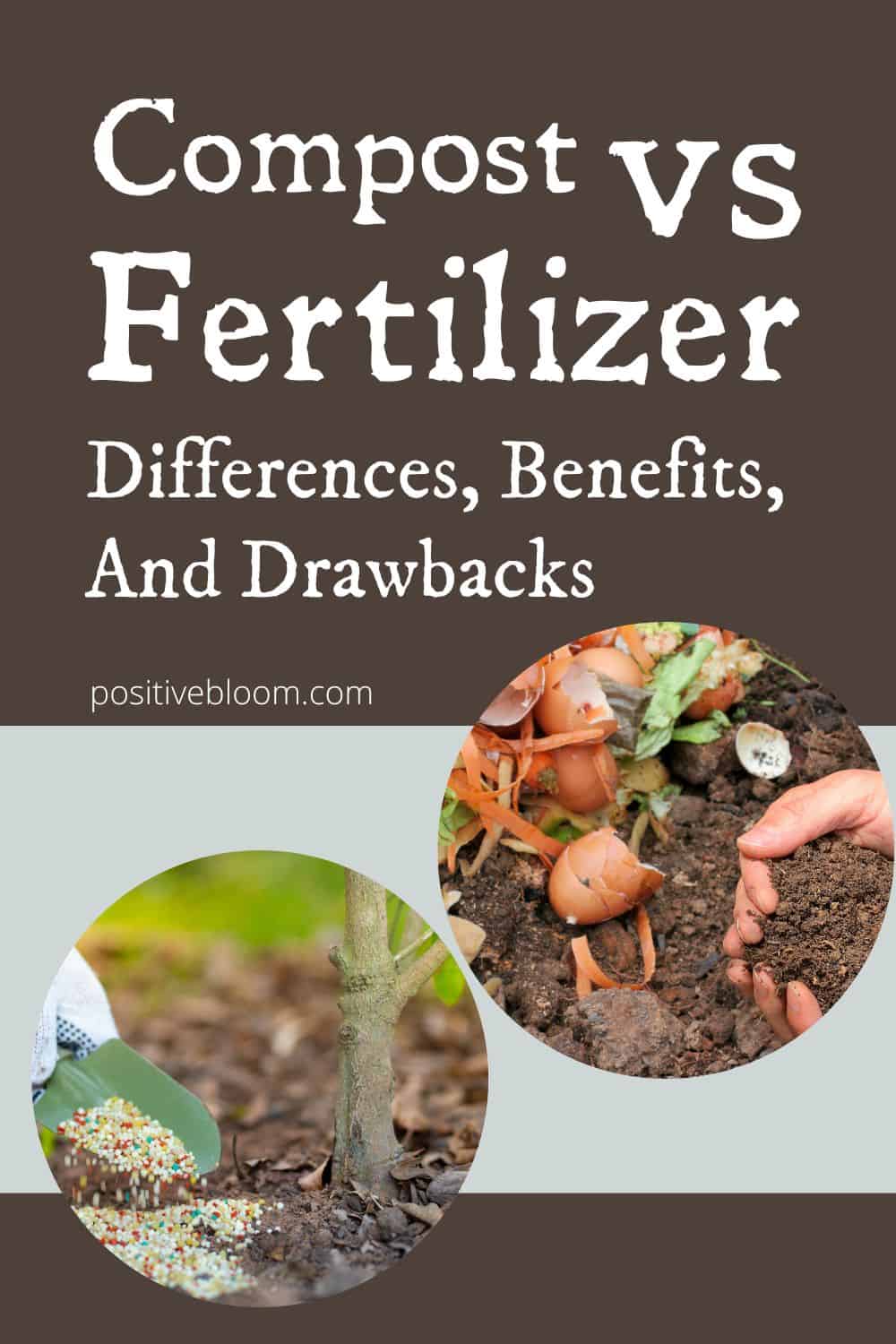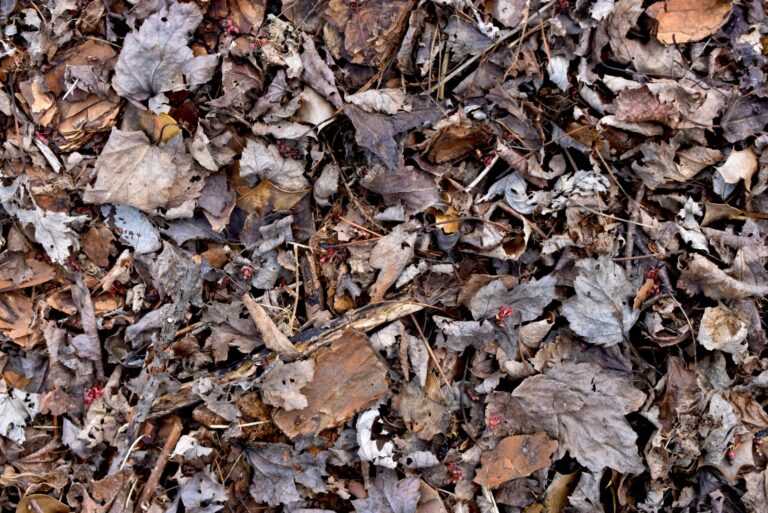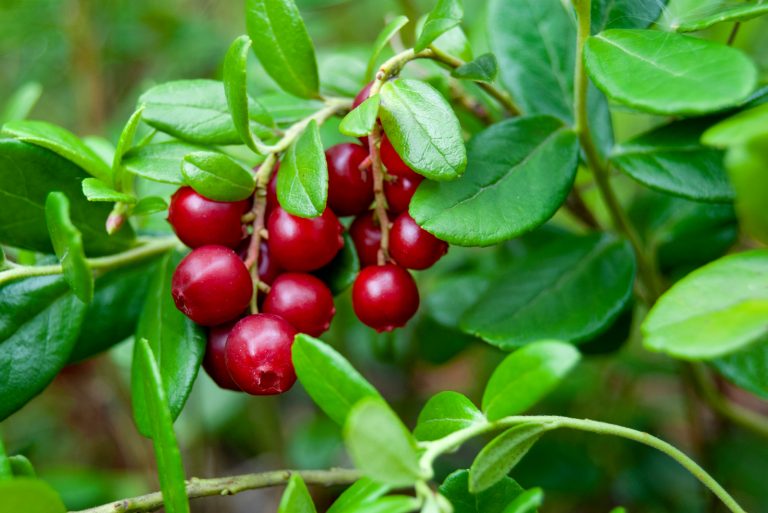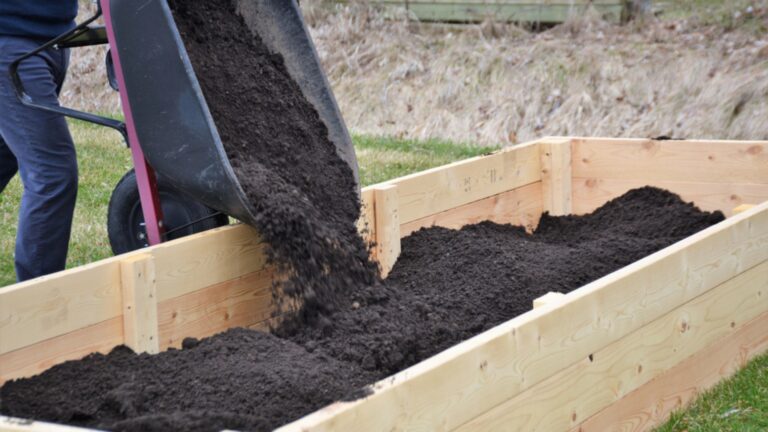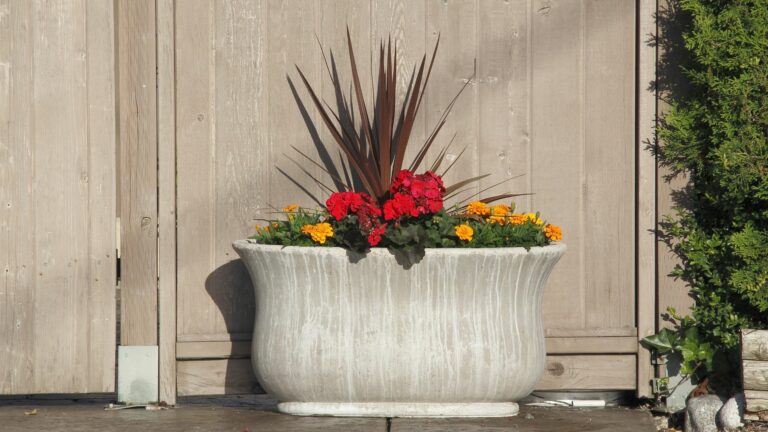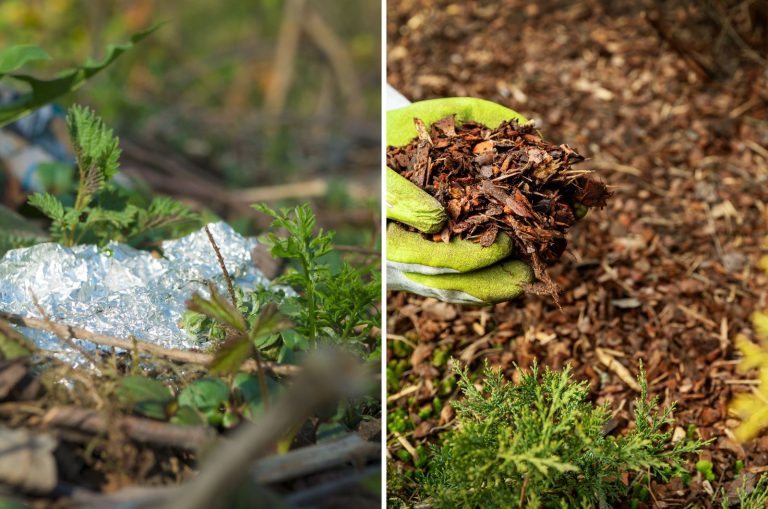Compost vs Fertilizer: Differences, Benefits, And Drawbacks
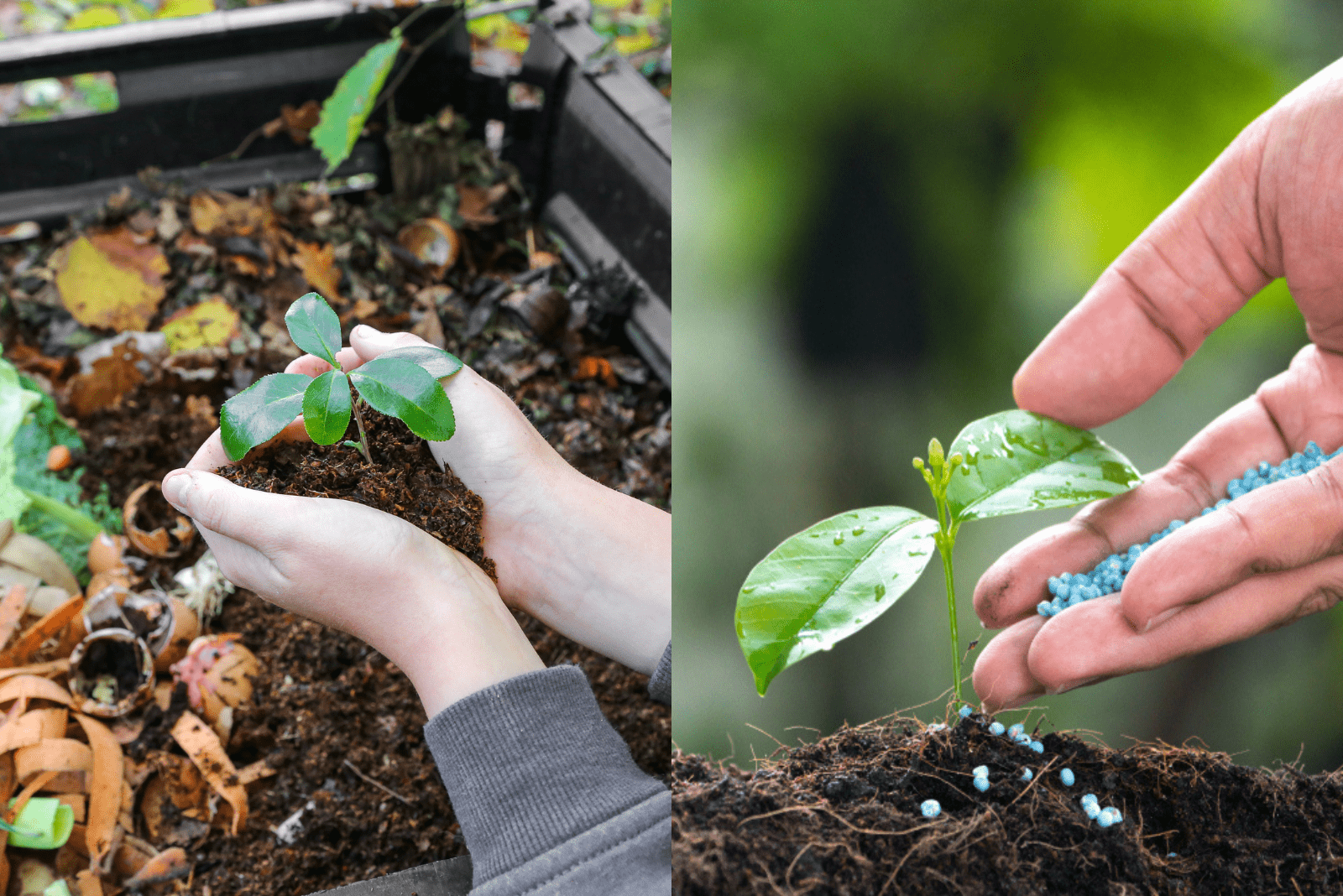
We all understand the importance of adding organic matter and nutrients to natural soil, potting mediums, etc., but how do you decide what to use?
There are composts and fertilizers, but which one is better? How and when should you use them?
These are all questions that we’ll tackle in this article, together with examining the differences between compost vs fertilizer.
But let’s not wait any longer and, instead, get straight to the point.
Compost vs Fertilizer
Compost and fertilizer are not the same things!
In the sections below, we’ll discuss some main differences between these two materials, such as their differences in amending and affecting soil health, NPK ratios, application, and production.
Differences In Amending The Soil
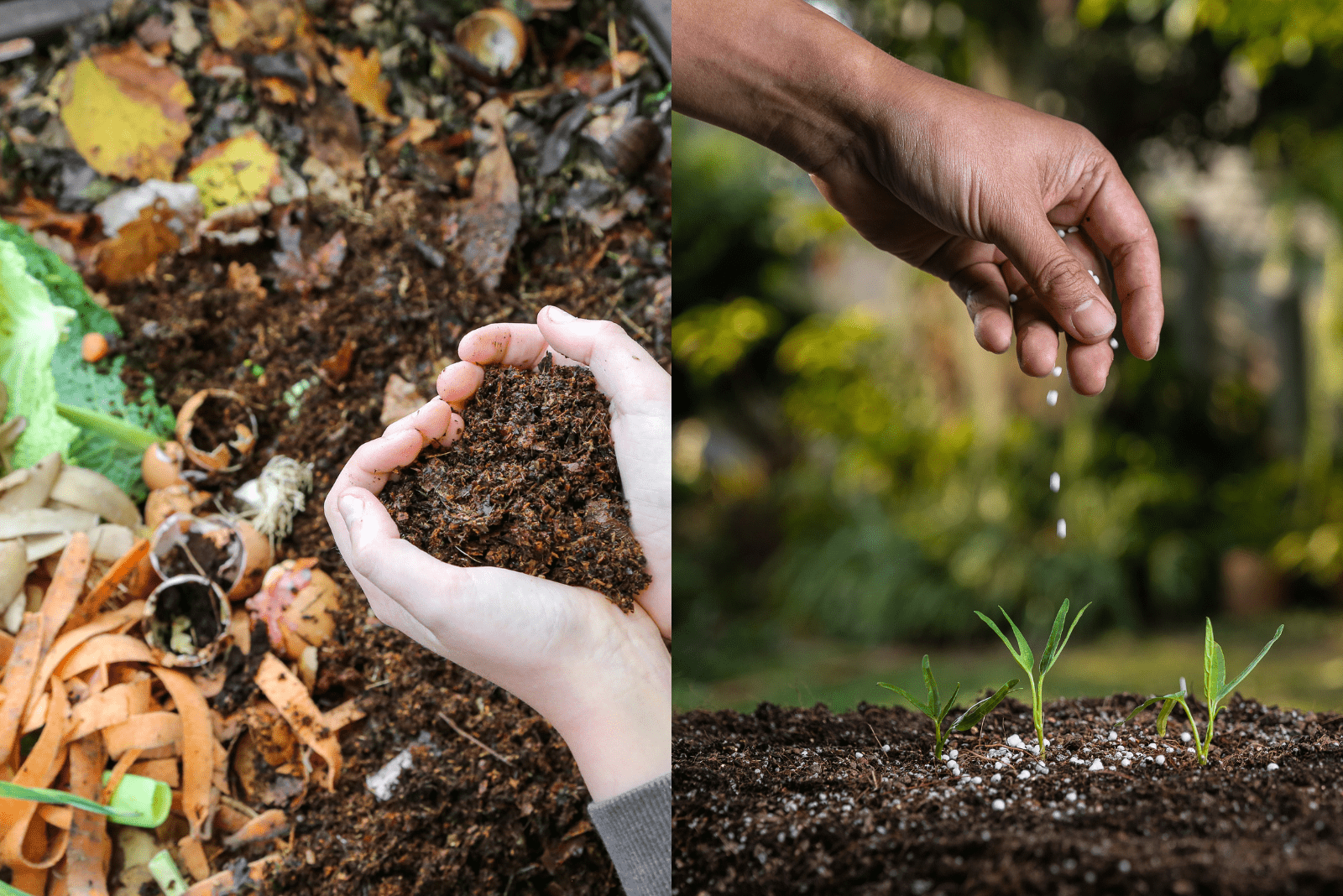
The main difference between these two ingredients is that fertilizers contain nutrients that are available to the plant immediately after application. In contrast, compost contains these minerals in its organic material, which has to decompose to release them.
Compost also improves the structure of the growing medium and feeds the soil food web, whereas fertilizers only provide nutrients to plants. Therefore, compost is more of a soil amendment that improves drainage, water retention, aeration, makes the soil loose, and improves the overall health of the substrate.
Fertilizer, on the other hand, cannot improve the soil structure; it simply feeds the plants.
We have to mention that there are organic and chemical fertilizers, and it is even more challenging to distinguish between organic plant food and compost.
You can even make organic fertilizers at home, such as tea fertilizer, bone meal, etc. However, these ingredients don’t improve the soil structure, which is the main difference between this material and compost.
Differences In Affecting Microbial Life
One of the reasons many gardeners opt for compost is that it doesn’t affect microbial life, nor does it disrupt the soil balance.
In fact, the decomposition process that happens in compost enriches the soil with microorganisms and attracts earthworms, which all contribute to soil and plant health.
Once all the decaying matter decomposes, your soil is left with humus, which enriches the growing medium.
On the other hand, fertilizers may disrupt this balance, hinder the beneficial microbes, and lead to salt build-up that can harm your plants if you don’t change the substrate regularly or flush it with water.
Differences In NPK
Furthermore, compost doesn’t contain a specific NPK ratio and cannot feed the plants like fertilizers, especially the inorganic ones. Synthetic fertilizers are usually used to speed up plant growth.
We can choose a fertilizer based on our plant’s needs and opt for quick or slow-release fertilizers, liquid or granular varieties, and different NPK ratios.
For instance, there are balanced fertilizers, such as triple 19 plant food, that you can use for garden plants and vegetables, flowers, trees and shrubs, and even lawns (in some cases).
But there are also varieties with specific nutrients, such as phosphates, which promote flowering and fruit setting, making them ideal for veggies.
However, since synthetic fertilizers may be too strong for certain plants, they usually have to be diluted due to a high presence of micronutrients such as nitrogen, phosphorus, and potassium.
On the other hand, compost doesn’t contain nearly as many nutrients as fertilizers, so you won’t see anyone thinning it.
Of course, there are different types of fertilizers, and if you opt for an organic variant, you don’t necessarily have to be careful about the amount you use. They can still be harmful in great quantities but are still much safer than chemical ones.
Differences In Application
Another difference between fertilizers and compost is in their application. Both are relatively easy to apply, but there are certain differences that we’ll discuss below.
First of all, you don’t have to be too careful when using compost. Just add an inch or two around your plant and then work it into the garden soil. Even if you use a bit more, your plants won’t mind.
But it is a different story with fertilizers. There are different types of fertilizers, and you can choose whether to use spikes, liquid, powder, or granular varieties.
Also, you’ll have to be careful about the strength of the fertilizer and the amount you add, which is why they are generally considered more complicated to use than compost.
For instance, spikes are pretty easy to use, and all you have to do is stick them into the substrate. Granules are also not far behind, as you just have to push them into the soil by hand or apply them before planting.
However, liquid fertilizers do require some preparation. You’ll usually have to dilute them before application as they are too concentrated.
Finally, powdered fertilizers are also not that difficult to use, and you can either dilute them or simply work them into the soil; it all depends on their strength and whether they are organic or inorganic.
Differences In Making
One of the good things about making your own compost is that you can control which ingredients you add.
For instance, if you think that your plants will benefit from more calcium, you can compost some eggshells. But if you need more magnesium, you can always add some seaweed to them.
But you might ask yourself, “How long does it take to make compost?” and the answer is about three months. So you see, you won’t have to wait too long to start using the soil amendment you make.
All you’ve got to do is mix some green things (or rather fruit and vegetable leftovers), such as orange peel, banana peel, coffee grounds, grass clippings, etc., with some brown stuff, such as fallen leaves, straw, wood chips, etc.
Add it all to the compost pile, add some water if there’s no rain, and turn it over occasionally.
On the other hand, it might be easier to simply go to the store and get a fertilizer with all the necessary micro and macronutrients, such as magnesium, iron, manganese, and calcium.
Of course, you can make your own organic fertilizer, such as blood or bone meal, if you love crafting and exploring new DIY methods.
Benefits And Drawbacks Of Using Compost
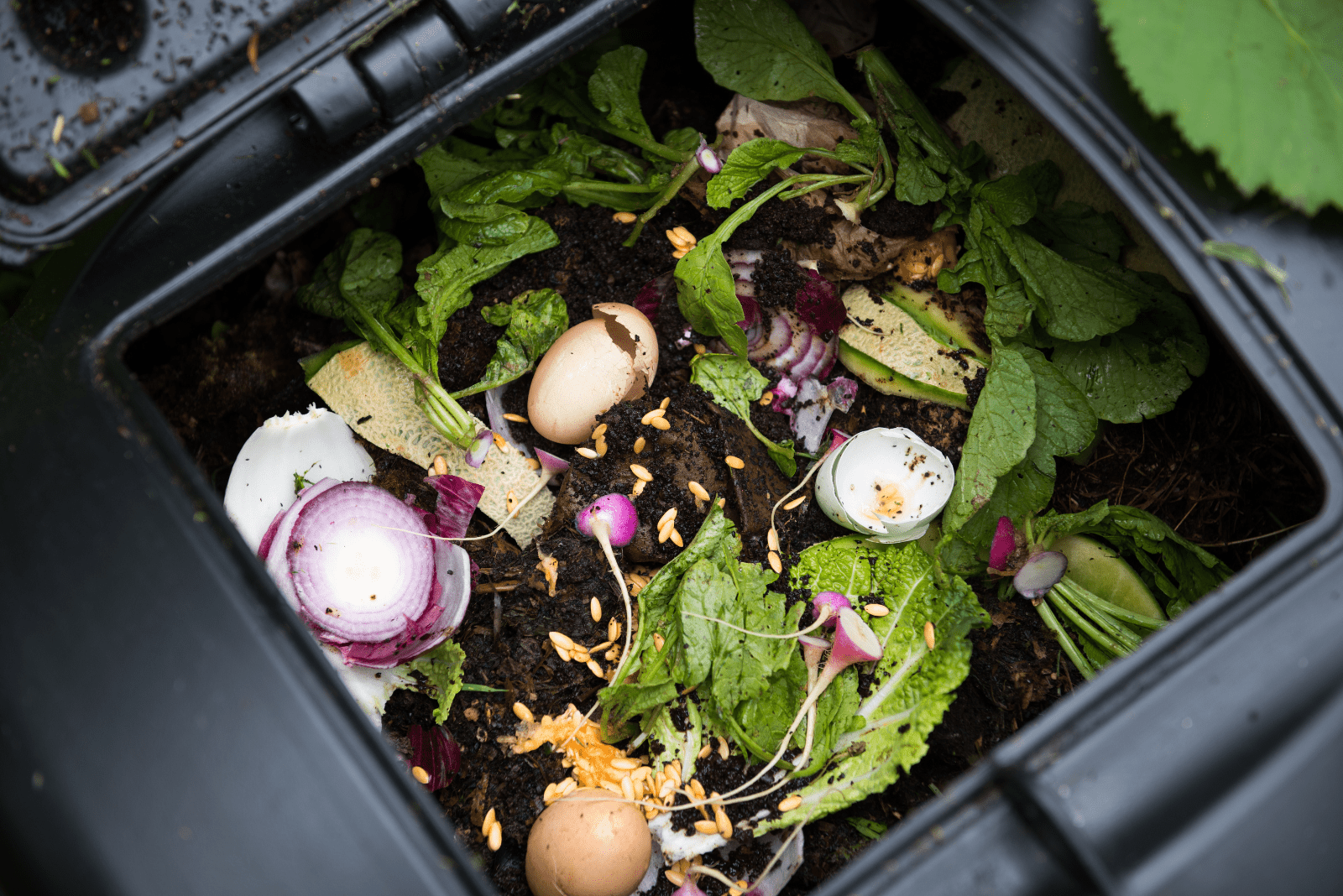
There are many benefits of compost, which we’ll mention in the following paragraphs, but I do have to add that it’s not all roses!
Compost has its drawbacks, and even though they aren’t that frightening, they can still be a decisive element if you need to decide whether to use compost or fertilizer.
So, let’s examine some pros of composting:
• Can be used as mulch
• May prevent weed growth when used as mulch
• Improves the soil structure by increasing drainage, aeration, and moisture retention
• Provides the soil with necessary macro and micronutrients
• Attracts earthworms and encourages the reproduction of beneficial microorganisms
• Promotes resistance to plant diseases
• Great for the environment since you can recycle kitchen scraps and woody materials
• Much cheaper than fertilizers since you can make your own
But, as we mentioned, there are some drawbacks of using compost, so here they are:
• May contain pathogens that endure in the soil, so if you have put a diseased plant part on the pile, you might infect your garden
• It takes about three months to make good compost, so you cannot use it at any given moment
• It takes both time and effort to make compost, as you’ll have to turn the pile every once in a while to ensure the compost is adequately made
• Composting requires a special place and takes up some space in your garden
• It might spread an unpleasant smell
• Might not contain enough nutrients for your plants
Benefits And Drawbacks Of Using Fertilizer
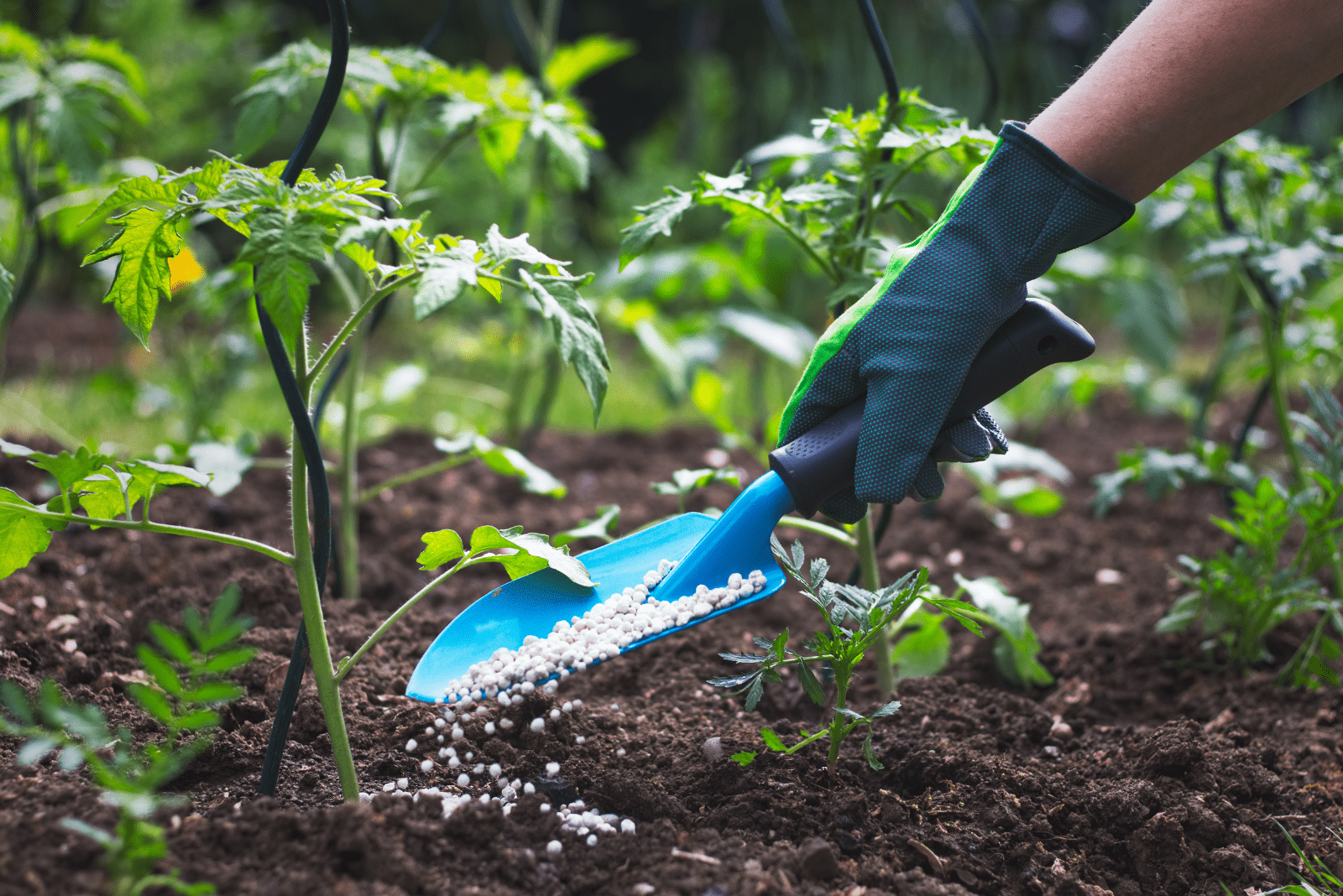
We’ve heard many “bad things” about fertilizers, such as that they are bad for the environment, they can hurt plants, and so on.
But they do have many benefits, otherwise they wouldn’t be massively produced.
So, we’ll discuss some pros and cons of fertilizers, which will make it easier for you to decide what you need to get healthy plants.
Here are the benefits of fertilizers:
• Rich in nutrients
• Speed up the plants’ growth
• Can meet specific plant requirements and reduce nutrient deficiency
• Quickly deliver food to plants and ensure that they grow bigger
• You don’t have to wait to make fertilizers; just get them online or in the garden center
• Easy to transport
But there are also drawbacks to using fertilizers, and you can find them below:
• May damage the soil balance and discourage microbes in the medium, which may result in depleted soil
• Runoff chemicals may contaminate groundwater and nearby bodies of water
• May burn the plant’s roots and cause salt build-up, inhibiting the plant’s ability to uptake nutrients and water
• These chemicals result in faster plant growth, but sometimes the roots cannot handle that, making the plants more prone to pest infestations and diseases
• More expensive than compost, which can be made from fruit and vegetable leftovers and old leaves and wood parts
How And When To Use Compost Or Fertilizer
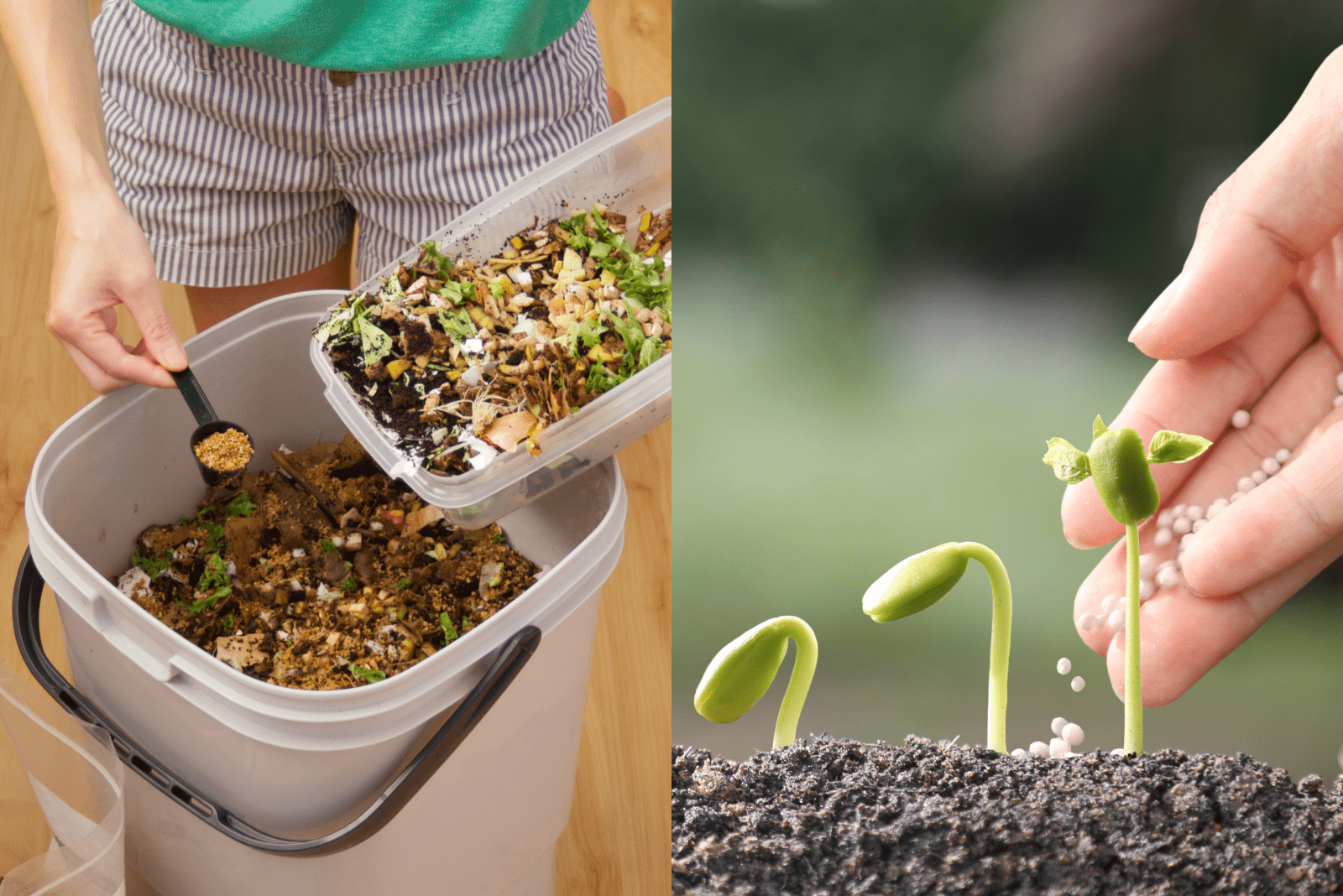
We can use compost all over the garden, whether we just want to make the soil more loose, fertile, or moisture retentive.
It is even common to lay some compost around your plant as mulch to keep moisture in and maintain soil temperature.
But using fertilizers differs from using compost. For instance, there are many different fertilizers out there, so the first thing you’ll have to bear in mind is to choose the right type.
Many plants can benefit from balanced, general-purpose fertilizers, but if you want more flowers and fruits on your veggies, you’ll have to use a different one.
Just one example is 10-20-20 plant food, which is perfect for root veggies since it contains a lot of phosphates that encourage rooting and promote fruit setting.
But we’ll examine different situations in which you can use fertilizer or compost and explore their benefits for lawns, garden plants, potted plants, and trees and shrubs.
Fertilizer vs Compost For Lawns
You can use compost for landscaping, when establishing a new lawn, or when treating bald spots. When planting a new turf, work about 3 inches of the compost to a depth of 5–8 inches before sowing. (But planting the grass seeds on top of the compost is not a terrible idea either!)
If you already have a lawn, but it has some bald patches, just add an inch of compost into the soil and overseed.
Finally, if you just want to make the soil less compact, add some organic content, and improve the structure, you can just spread it evenly over the lawn, gently rake it to ensure everything is covered, and then let it settle into the substrate.
When using fertilizers, it is best to add a starter fertilizer before planting and then research the best fertilizer for new sod. The next feeding should be about a month or a month and a half after the grass seeds have germinated.
If you want to plant a new lawn, the best choice is a quick-release phosphorus-rich fertilizer that promotes root growth. Once the seeds have germinated and your lawn is established, you can switch to a slow-release fertilizer that’s rich in nitrogen.
Compost vs Fertilizer For Gardens
One of the things I love about compost is that you can add it pretty much everywhere, be it a flower bed, vegetable garden, or a raised bed.
When preparing your garden beds, it is best to add plenty of compost into the soil in the fall and leave it there to overwinter. Once the spring arrives, work it into the ground and start planting your veggies. You can add this material into every hole or even use it as a mulch.
Fertilizers are used in a slightly different way. The best way is to add granular fertilizer into each hole before planting and then to the sides of the holes, about 2–3 inches around them.
Water your plants thoroughly to ensure that the nutrients in the fertilizer are available to your plants and to avoid fertilizer burn.
Of course, you can use liquid fertilizers, which are excellent for fast-growing plants as they are immediately available, unlike granules. However, you will have to reapply them more frequently, whereas granules can last 3–12 months, depending on the variety.
Compost vs Fertilizer For Potted Plants
It is also possible to use compost for potted plants; just add an inch to the potting soil to improve its drainage, aeration, and fertility.
Of course, you can use fertilizers, but you’ll have to be careful about the amount, strength, and frequency. For instance, most plants prefer regular houseplant fertilizers once or twice a month, but you’ll have to dilute them to half-strength (or more if indicated on the package).
One of the great things about fertilizers is that there are many varieties specifically tailored to your plant’s needs, so you can use fertilizers for orchids, succulents, palm trees, etc.
Some plants, like orchids, benefit from weekly fertilization, but in this case, you should dilute the plant food to at least quarter-strength to prevent root burns.
We usually use liquid fertilizers for potted plants, but if you don’t have the time to monitor your plants constantly, you can use fertilizer spikes.
Leafy plants, such as coffee arabica, especially benefit from it.
Fertilizer vs Compost For Trees And Shrubs
Compost is beneficial for trees and shrubs as it imitates forest conditions and maintains the proper soil temperature, provides organic material, and reduces water loss.
You can add compost to newly planted trees, but don’t throw it into the holes before planting, as this can inhibit the spread of roots beyond the hole or create watering issues. Instead, apply compost as a mulch to get all the benefits of compost and to prevent weed growth.
But no one said you cannot work some compost into the soil. In fact, it is beneficial to add this ingredient and mix it with the topsoil as it improves the soil structure and enriches it with organic content.
Just ensure not to pile up the tree bark or cover the exposed tree roots with it since that can lead to rotting, diseases, and pest infestations.
When choosing the best plant food for your tree or shrub, you should opt for the ones that fit your plant perfectly. For instance, if you have a lemon tree, get and use lemon tree fertilizer.
But generally speaking, shade trees and shrubs respond well to fertilizers with higher nitrogen percentages, so choose a variety such as 18-6-12, 10-8-6, 10-8-4, etc.
Use a granular, slow-release fertilizer in spring, spread evenly, and water the plant thoroughly.
Frequently Asked Questions
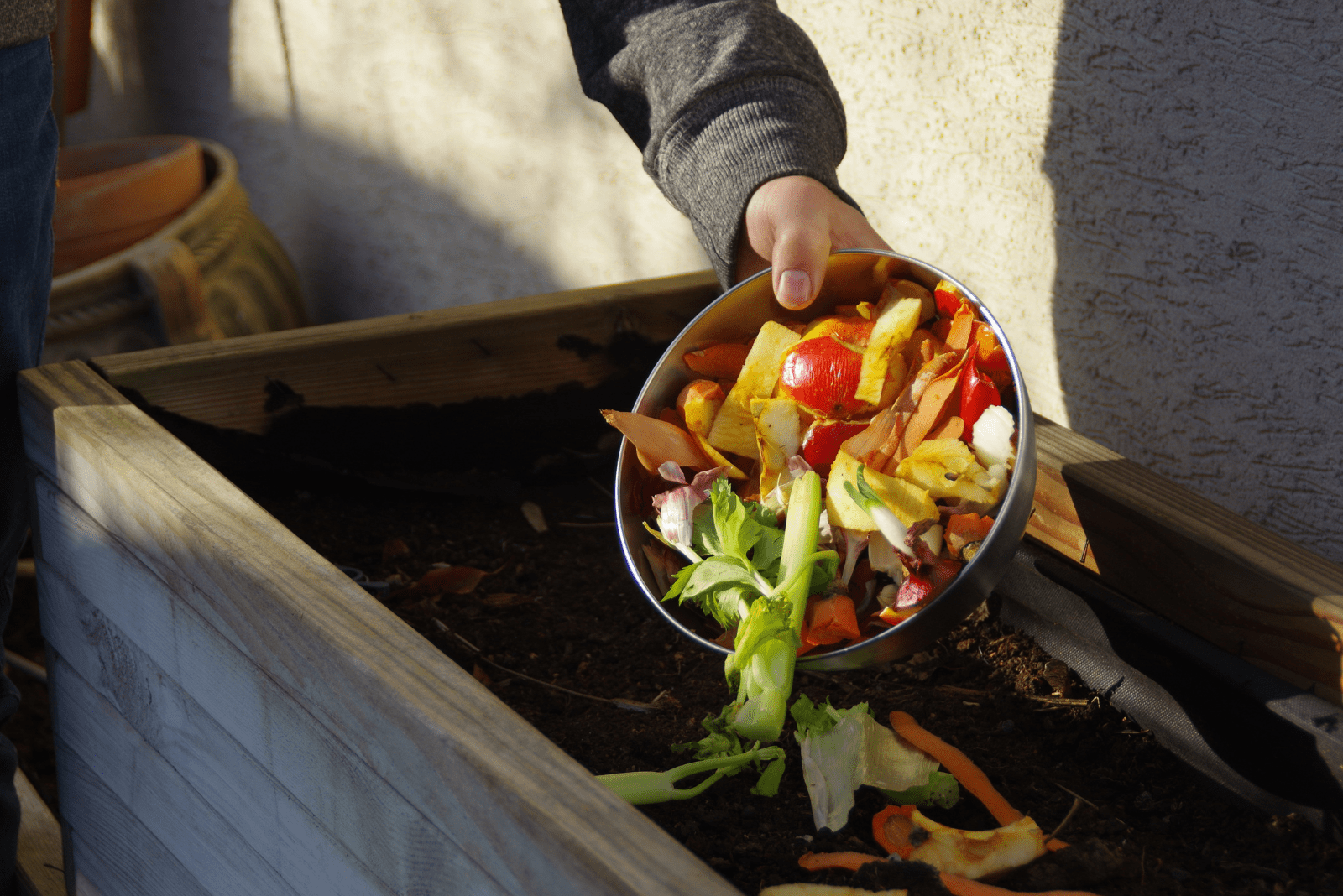
We’ve answered some of the crucial questions considering compost and fertilizer, but there are still some other questions that have been left unanswered. (Or so it seems!)
Below, we’ll answer some of the questions you’ve frequently asked us and help you with your dilemmas.
Can you use compost and fertilizer together?
Yes, you can use fertilizer and compost together, and there are a couple of benefits to doing this.
Compost improves the retentive abilities of soil and will hold the nutrients released by fertilizers and store them until your plant needs them.
Compost also contains some micronutrients that aren’t usually found in fertilizers (such as boron), so the two ingredients can complement each other splendidly and help your plants thrive.
Can too much compost hurt plants?
Compost can hurt and even kill your plants if you use it in large quantities. This material can suffocate your plant, and it can also lead to other issues, especially if not prepared properly.
Compost can smother your lawn or other plants by cutting off light and reducing air circulation, leaving your plants without oxygen.
Sometimes, compost contains too much phosphorus, which can hinder a plant’s ability to uptake iron and manganese.
A lack of the latter nutrients may lead to chlorophyll deficiency, and your plant will become yellower and yellower, unable to photosynthesize and produce its own food and energy.
Is compost better for the environment than fertilizer?
Yes, compost is definitely safer for the environment than fertilizer as it doesn’t contain harsh chemicals that can leach into the groundwater and poison them.
It is also made by recycling organic waste, and if you make it yourself, there won’t be any packaging (plastic or otherwise) that you’ll have to dispose of later.
However, it does take some time to make compost, but you can always order it from Amazon if you don’t want to wait at least three months for your own to be ready.
Wrapping Up
One thing we can conclude for sure is that there is no winner in the battle of “Compost vs Fertilizer.” Both of these materials have their benefits, and it is up to you to decide which one you need more.
However, the best choice you could make is to use them together because the compost will improve the soil structure and make it more draining, aerated, and water-retentive. At the same time, the fertilizer will provide the necessary nutrients in greater quantities.
Furthermore, both of these materials can be used individually for lawns, gardens, potted plants, and trees and shrubs. Still, the combination of the two will guarantee a high yield, lush green foliage, and breathtaking landscape design.
Until next time!
Like this post? Share or pin it for later!
